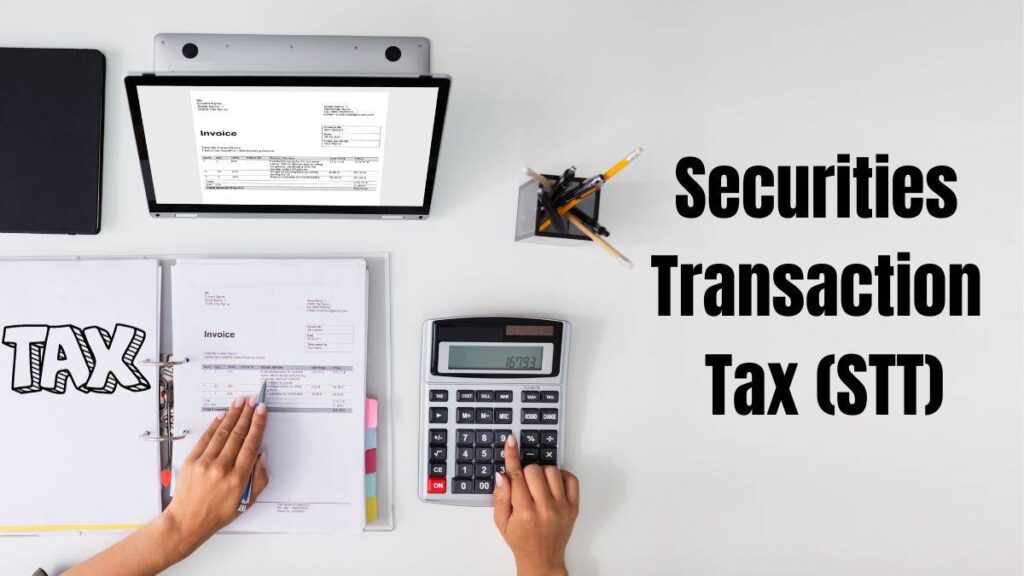Securities Transaction Tax (STT)

Securities Transaction Tax (STT)
Securities Transaction Tax (STT) is a tax levied in several countries, including India, on transactions involving securities such as stocks, derivatives, equity mutual funds, and equity-oriented exchange-traded funds (ETFs). It is designed to generate revenue for the government and help regulate securities markets.
1. Types of Securities Covered: STT typically applies to transactions involving listed securities on recognized stock exchanges. These securities may include stocks, equity derivatives (such as futures and options), equity mutual funds, and equity-oriented ETFs.
2. Tax Rates: The tax rates for STT vary depending on the type of security and the nature of the transaction. For example, different rates may apply to equity shares, equity derivatives, and mutual funds. The rates may also differ for transactions involving purchase, sale, or both.
3. Collection Mechanism: STT is usually collected by stock exchanges or depositories at the time of transaction execution. It is deducted from the consideration paid or received by the buyer or seller, depending on the nature of the transaction.
4. Exemptions and Concessions: Some transactions may be exempt from STT or eligible for concessional rates. For example, intra-day equity trades (where the same shares are bought and sold on the same day) may be subject to lower STT rates compared to normal delivery-based trades.


5. Impact on Investors: STT has an impact on investors and traders participating in the securities markets. The tax is factored into the overall cost of trading and may influence trading strategies, particularly for high-frequency traders or investors engaged in short-term speculation.
6. Revenue Generation: STT contributes to government revenue and helps fund various public expenditure programs. It also serves as a regulatory tool to discourage excessive speculation and promote long-term investment in capital markets.
In India, Securities Transaction Tax was introduced in 2004 as a part of the Finance Act, 2004, and has undergone revisions over the years to align with evolving market dynamics and regulatory objectives. It is an integral component of the Indian securities market ecosystem and is closely monitored by market participants, regulators, and policymakers.
Why US ?
Our Firm, Singh Suri & Company Chartered Accountants, offer services related to Security Transaction Tax (STT), which is a tax levied on certain securities transactions in some jurisdictions.
1. Compliance and Reporting: We assist businesses and individuals in complying with STT regulations by ensuring accurate calculation and timely payment of STT liabilities. We-e help clients understand their STT obligations, maintain proper records of STT transactions, and prepare and file STT returns as required by law.
2. Transaction Structuring: We provide advice on transaction structuring to minimize the impact of STT on securities transactions. W analyze the tax implications of different transaction structures and recommend strategies to optimize tax efficiency while achieving clients’ financial objectives.


3. Due Diligence: We conduct due diligence reviews of securities transactions to assess STT compliance and identify any potential risks or issues. We review transaction documents, verify STT calculations, and ensure that transactions are executed in accordance with applicable STT laws and regulations.
4. Advisory Services: We offer advisory services on various STT-related matters, including the interpretation of STT laws and regulations, the tax treatment of specific securities transactions, and the impact of STT on investment decisions. We provide customized advice tailored to clients’ specific needs and objectives.
5. Representation and Advocacy: We represent clients in STT-related matters before tax authorities, appellate authorities, and tribunals. We assist clients in responding to STT notices, resolving disputes with tax authorities, and advocating on behalf of clients to achieve favorable outcomes.
6. Training and Education: We conduct training programs and workshops to educate clients on STT laws, compliance requirements, and recent developments. We help clients understand the implications of STT on their business or investments and train them to ensure compliance with STT regulations.
7. Tax Planning: We develop tax planning strategies to help clients minimize STT liabilities while achieving their financial goals. We analyze clients’ investment portfolios, identify opportunities for tax optimization, and recommend strategies to mitigate the impact of STT on investment returns.
8. Cross-border Transactions: For clients engaged in cross-border securities transactions, We provide guidance on the application of STT laws and regulations in different jurisdictions. We help clients navigate the complexities of international taxation and ensure compliance with STT requirements in relevant jurisdictions.

These are some of the services that Our Firm Singh Suri & Company, Chartered Accountants may offer in relation to Security Transaction Tax (STT) to assist businesses and individuals in complying with STT regulations, optimizing tax efficiency, and achieving their financial objectives.


